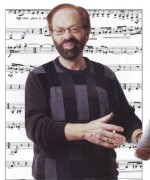Column Name
Title
Since studying composition at Juilliard, Michael Smolanoff (B.M. ’65, M.M. ’66) has taught, worked in publishing, run a film production company, written novels and screenplays for children and vampire fans—and also continued to compose. Recently he spoke with Juilliard Journal writer Michael Curran-Dorsano about mixing art and commerce.
Body
It was just about noon when I spotted the composer Michael Smolanoff sitting in the Juilliard lobby in a black leather coat, hiding behind his thick sunglasses.
We made our way toward the cafeteria to have a bite to eat, and he was immediately taken by the changes to the new building. Smolanoff was a student at Juilliard when it was on Claremont Avenue, before it moved to Lincoln Center in 1969, so even the cafeteria’s modest salad bar impressed him. “All we had to eat were hamburgers that looked like bombs,” he quipped.
We settled down with our lunches, and Smolanoff launched into his life story. He grew up in the Bronx, and from an early age played the trombone, but before long he became more curious about his fellow musicians’ parts than his own. When he attended one of the New York Philharmonic’s famed Young People’s Concerts and saw Leonard Bernstein conduct and discuss The Rite of Spring and Prelude to the Afternoon of a Faun in the same program he couldn’t help but ask, “How did they do that?” Eager for answers, he enrolled in the bachelor’s—and later master’s—programs at Juilliard, where he studied composition with, among others, Vincent Persichetti, Stanley Wolfe, and Aaron Copland, and received his degrees in 1965 and 1966.
Since earning a doctorate in composition from the now defunct Combs College of Music in Philadelphia, Smolanoff has written and published approximately 45 pieces, performed all over the country, and collected numerous awards. He’s also been a conductor, teacher, editor, record producer, screenwriter, novelist, and president of his own production company. At one time, he was the owner of one of only a few giant Synthi 100 synthesizers in the world. So when he leaned over and said, “I’ve seen it all,” I believed him.
After working in book and music publishing as well as teaching at Rutgers and a number of other institutions, Smolanoff started writing music commercially, and he’ll be the first to admit he has made compromises along the way. “You sort of lose your idealism, but I tried to do the best I could while still being in the business” he said. He described some inevitable bumps along the way, from cutthroat competition and two-faced investors to the dangerous dealings of Wall Street. Despite all this, he managed to write numerous screenplays, books, and films.
To satisfy artistic and financial needs, Smolanoff advised, “You’ve got to work with someone honest.” That is not always an easy feat in the music and film industries, he said. But Smolanoff has made it work by trying to learn as much as possible—and enjoying himself. While he still writes books and screenplays, music remains the focus of his life. He is currently composing the scores for film adaptations of two of his novels, The Scary Kids Club (Xlibris 2010) andBehind the Oval Portrait (PublishAmerica 2007), and hopes to draw on his classical roots to create a rich contemporary sound.
Another key to his success, Smolanoff said, has been surrounding himself with good people, including his longtime film partner, the director Ronan O’Leary; his wife and children—and his 29-year-old African gray parrot. He described his mentors and teachers at Juilliard as walking history books, windows into a world inhabited by some of the greatest artists of the last century. “To paraphrase Hemingway, Juilliard has always been a movable feast. Wherever I have gone in my lifetime Juilliard has always been with me.”





